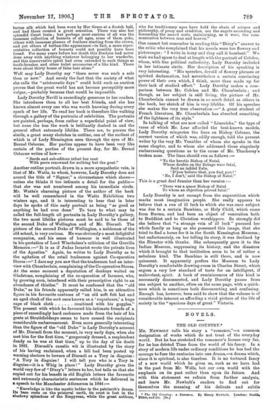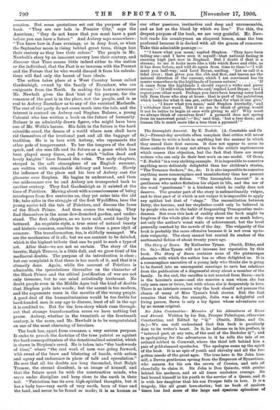NOVELS.
THE OLD COUNTRY*
Mn. NEWBOLT calls his story a "romance,"—a common designation of works which do not treat of the everyday world. But he has stretched the romancer's license very far, for he has deleted Time from the world of his fancy. In a story of modern life under ordinary conditions he has had the courage to fuse the centuries into one drama,—a drama which, since it is spiritual, is also timeless. It is no tortured fancy of a new world which he gives us, such as we have had in the past from Mr. Wells, but our own world with the emphasis on its past rather than upon its future. And with this statement we refrain from further analysis, and leave Mr. Newbolt's readers to find out for themselves the meaning of his delicate and subtle • The Old Country : a Romance. By Henry Newbolt. London: Smith, Elder, and Co. {66.1 creation. But some quotations set out the purpose of the book. " They are raw lads in Premier City," says the American; "they do not know that you must have a past before you can have a future." And Aubrey says somewhere: " You know how in June evenings, or in deep frost, or when the September moon is rising behind great trees, things lose their century as they lose their colour." The people in Mr. Newbolt's story by an innocent sorcery lose their century, and discover that Time means little indeed either to the nation or the individual, that the Past is so inwoven with the Present and the Future that he who would discard it from his calcula- tions will find only the barest of bare ideals.
The action takes place at a West Country house called Gardenleigh, owned by the family of Earnshaw, who are emigrants from the North. In making the host a newcomer Mr. Newbolt gives the first • hint of his purpose, for the romance of the past is in the place, not the people, and is as real to Aubrey Earnshaw as to any of the vanished Marianas. The rest of the party do not come much into the tale, and the interest is centred on Aubrey and Stephen Bulmer, a young Colonial who has written a book on the future of humanity. Bulmer is an admirably drawn figure, who might have been one of Mr. Wells's heroes. His faith in the future is the hard scientific creed, the dream of a world where men shall have rid themselves of the irrational past and all the baggage of tradition. He is in love with Aubrey, who represents the other pole of temperament. To her the tongues of the dead speak, and she sees life and its future as a game which has been played- many times, and for which "ladies dead and lovely knights" have framed the rules. The early chapters, steeped in the soft atmosphere of an English summer, are written with remarkable delicacy and beauty. Slowly the influence of the place and his love of Aubrey cast the glamour over Stephen. He begins to understand, and then one midsummer eve he and Aubrey are transported back to another century. They find Gardenleigh as it -existed at the time of Poictiers. Moving about with a consciousness of being interlopers from five centuries on, they yet enter into the old liie, take sides in the struggle of the first Wycliffites, hear the young squire tell the tale of Poictiers, and discuss the fame of the Black Prince. And then comes the waking. They find themselves in the same dew-drenched garden, and under- stand. The first chapters, as we have said, could hardly be bettered. An exquisite style, a true sense of natural beauty and historic romance, combine to make these a pure idyll of summer. The transformation, too, is skilfully managed. We see the mechanism of it all ; but we are content to be deluded, which is the highest tribute that can be paid to such a type of art. After that—we are not so certain. The story of the heretic, Ralph Tremur, is a little dull, and we grow tired of his mediaeval doubts. The purpose of its introduction is clear ; but our complaint is that there is too much of it, and that it is clumsily done. Again, while the account of Poictiers is admirable, the speculations thereafter on the character of the Black Prince and the ethical justification of war are not only tiresome, but to our mind artistically irrelevant. No doubt people even in the Middle Ages had the kind of doubts that Stephen puts into words ; but the accent is too modern, and the arguments come in the mouths of the wrong people. A good deal of the humanitarianism would be too feeble for hard-handed men in any age to discuss, least of all in the age it is credited to. But for the love-story which runs through- out that strange transformation scene we have nothing but praise. Aubrey, whether in the twentieth or the fourteenth century, is the same, and Mr. Newbolt is to be congratulated on one of the most charming of heroines.
The book has, apart from romance, a very serious purpose. It seeks to preach the doctrine of the true patriot as against the hard cosmopolitanism of the denationalised scientist, which is shown in Stephen's creed. He is taken into " the backwoods of time," where "the real work of men was going forward, with sweat of the brow and blistering of bands, with action and agony and endurance in place of talk and speculation." He sees that all his doubts are long descended, that Ralph Tremur, the eternal dissident, is an image of himself, and that the future must lie with the constructive minds, who serve under discipline and keep close to the earth in their toil. "Patriotism has its own high-spirited thoughts, but it has a body too—very earth of very earth, born of time and the land, and never to be found or made; it is as human as
our other passions, instinctive and deep and unreasonable, and as hot as the blood by which we live." For this, the deepest purpose of the book, we are very grateful. Mr. New• bolt reads his countrymen an eloquent lesson, none the less profound because it is decked with all the graces of romance. Take this admirable passage: " • I know what you mean,' replied Stephen. They have been telling me—and I have seen it myself—that national feeling is running high just now in England. But I doubt if that is a stream ; to me it looks more like a tide which flows and ebbs, as it has done before, and will do again from time to time.'—' I will meet you half-way,' said Lord Bryan, smiling. 'Let us call it a tidal river ; that gives you the ebb and flow, and leaves me the natural direction of the current, which I am convinced has its
source somewhere in the highlands of human nature.'
it came from the highlands I should expect a wider and purer stream.'—' It will widen before the end,' replied Lord Bryan ; and I regret your other word. Perhaps you have been hearing some loud talk from those who stay at home: that is part of the patriotism which looks for what it can get, rather than for what it can give.'
I know what you mean,' said Stephen hurriedly, and I withdraw that word. But if we are to think of giving, would it not be better to begin at once with giving to all ? Why must we always think of ourselves first? A pyramid does not spring from its narrowest point.'—' No,' said Guy, but a tree does ; and human life is much more like a tree than a pyramid.' "



























































 Previous page
Previous page